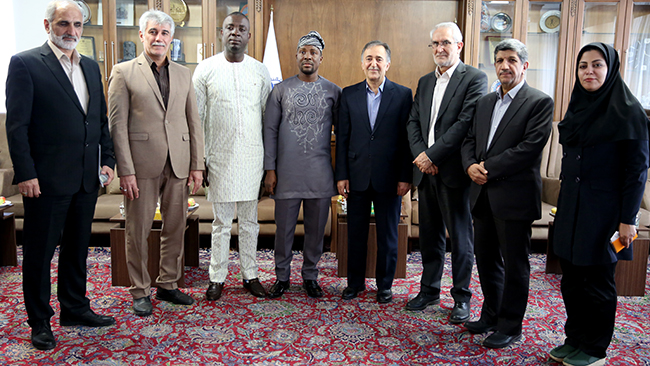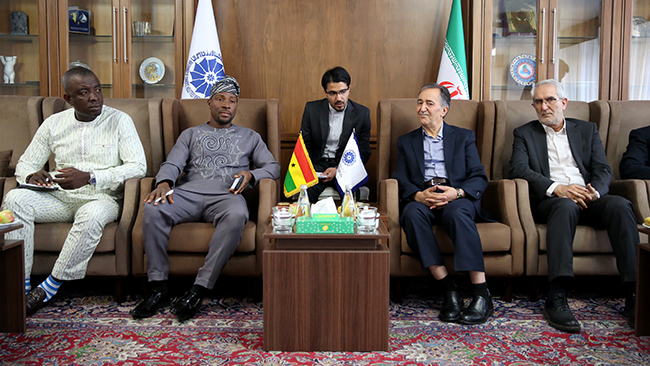Iran’s commercial centre in Ghana is set to open next month, says president of Hamedan Chamber of Commerce.
Ali Asqar Zebar Dast, President of Hamedan Chamber of Commerce, Industries, Mines and Agriculture (HCCIMA), announced on Sunday that Iran’s commercial centre will be opened in Ghana in September.
“Its a big piece of land in the Ghanaian capital Accra that we have leased to showcase the Iranian products such as cosmetics, dried fruits, foodstuffs, construction material and the rest, …,” he told Iran Chamber Newsroom on Monday.
“In addition to these stuffs, we are going to ship Iranian-made furniture, wood-carved handicraft from Malayer city in a bid to promote the provincial artistic and industrial capacities,” added Zebar Dast, who met with head of Ghana-Iran Parliamentary Friendship Group Aziz Abdul Muniru in Tehran on Sunday.
The meeting was held at Iran Chamber of Commerce, Industries, Mines and Agriculture (ICCIMA). Muniru held talks with Ali Reza Ashraf, ICCIMA's Secretary General, Mohammad Reza Karbasi, ICCIMA's Deputy for International Affairs and a number of other Iranain economic operators.

Aziz Abdul Muniru, fourth from left, stands next to Ali Reza Ashraf, ICCIMA's Secretary General, in Tehran on Sunday. IRAN CHAMBER NEWSROOM
Although the Ghanaian market has shown interest in Iranian goods, the major obstacle on way of further developing trade ties with this central African country is the lack of Iranian shipping lines to Ghana. “We have to lease Indian oceangoing vessels,” Zebar Dast mentioned in the interview conducted on Monday.
According to the Iranian businessman, the process of exporting Iranian products to Ghana is very lengthy as the African country is part of the World Trade Organisation (WOT), “that is, all the goods need to get the necessary licences and certificates from various governmental and private organisation before exports happen”.

Iranian cement mill in Ghana
The Ghanian authorities had given the green light and even specified a site on which an Iranian cement production facility would be built.
The project didn’t go forward as Iranian and Ghanaian officials couldn’t reach an agreement on their partnership terms.
But, that hasn’t stopped Hamedan Chamber of Commerce, that has been chosen as the point provincial Iranian chamber of commerce to develop trade ties with Ghana to find a solution.
“Now, we are going to construct a 4-unit cement mill that will produce 2,000 tons of cement per year and we will export clinker from Iran,” noted Zebar Dast during the phone interview.
Extraterritorial cultivation
Iran is looking at fertile farms and ground overseas to cultivate some of its staples such as potato, onion, … to reduce costs and as well as save water due to irrigation troubles.
“We have been given 50,0000 hectares of land near Acra to cultivate what we want. Also, I’m in talks with local wise people (local rulers of each region in Ghana) to get 100,000 hectares more of fertile ground to cultivate our necessary vegetables,” reiterated the Iranian businessman.
He believes that Africa is th best place to produce Iran’s cereals and grains but exporting the finished foodstuffs back to Iran is not that easy. “The government needs to open Lines of Credits on each food item to produce the food items and export them to Iran,” he explained, expressing regret that the Iranian government doesn’t take the necessary measures to guarantee the purchase and export of the products.
Because of the lack of the Iranian governmental support, Hamedan Chamber of Commerce is cultivating potatoes and onions to feed the Ghanaian market only because “current potatoes in Ghana are imported from Burkina Faso and sold at $7 per kilo”.
The project will also help create jobs for Iranian farmers and agricultural experts. “I have sent several hundred Iranian graduates of agriculture major to Ghana to work on extraterritorial cultivation,” he stressed, explaining that there are 4,000 graduates of agriculture major from the Iranian universities that are unemployed because they can’t buy lands to work on.
Mining, housing and cacao processing factories are other great investment opportunities for Iranian businesses in the African nation of 28 million inhabitants, according to Muniru.
Tehran and Accra are seeking to broaden their commercial relations that will serve to cosolidate their political relations too. Muniru's visit is the second such visit by a Ghanian official in the past two months.
Back in June, Executive Secretary of Ghana Free Zones Authority (GFZA) Michael Okyere Baafi signed an MoU with Secretary of the Supreme Council of Iran's Free Trade, Industrial and Special Economic Zones Morteza Bank in Kish Island on Sunday about further commercial relations through free zones.